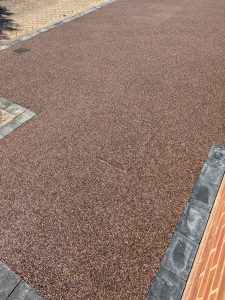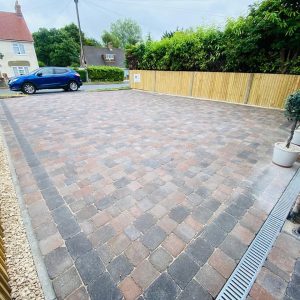Choosing the right surface for your driveway or patio in England is a big deal, especially with our notoriously unpredictable weather. You need a solution that’s not just visually appealing but built to withstand everything from relentless rain and harsh frosts to surprise heatwaves. The two main contenders? Resin and block paving. But when it comes to sheer longevity and resilience against the demanding UK climate, which one truly comes out on top?
This essential guide dives straight into the resin vs. block paving debate. We’ll dissect their typical lifespans, how they handle British weather, their maintenance demands, and aesthetic appeal. Our goal is to equip you with the knowledge to make a smart investment, ensuring your new surface enhances your property and stands strong for years to come.
What is Resin Paving?
Overview and Key Features
Resin paving, particularly resin-bound systems, is created by mixing natural aggregates (like gravel or crushed stone) with a clear, strong resin binder. This mixture is then hand-trowelled onto a suitable base, resulting in a smooth, seamless surface that’s both permeable and visually appealing. Resin driveways and patios are increasingly popular for their:
- Sleek, contemporary appearance
- Wide range of colour and aggregate choices, allowing for bespoke designs
- Seamless, anti-slip finish
- Excellent drainage due to permeability (meets Sustainable Urban Drainage Systems – SUDS – regulations, which are important considerations across East Sussex and the UK)
- Common uses: Driveways, patios, garden paths, and courtyards

Typical Lifespan in England
A professionally installed resin driveway, using high-quality, UV-stabilised materials and expert installation techniques, typically lasts between 15 and 25 years. With diligent care, some premium installations can even approach 40 years. Regular cleaning and ensuring the surface is kept free from harsh chemicals will help maximise its longevity. On the other hand, poor installation or the use of subpar, non-UV-stabilised materials may result in a significantly reduced lifespan and early wear.
How Resin Paving Handles UK Weather
- Permeability: Resin-bound paving allows water to drain directly through its surface. This significantly reduces puddles and standing water, thereby minimising issues like ice formation and freeze-thaw damage in winter.
- UV Resistance: Modern, high-quality resins are UV-stabilised, meaning they are formulated to resist fading and discolouration from sunlight. Cheaper, non-stabilised options can yellow or break down over time when exposed to UV rays.
- Temperature Performance: Resin paving maintains some flexibility, which helps it withstand temperature fluctuations common in the UK climate without cracking.
What is Block Paving?
Overview and Key Features
Block paving involves laying individual bricks or blocks-typically made of concrete, clay, or natural stone-in specific patterns over a prepared sub-base and a bedding layer. Its key features include:
- Traditional, timeless aesthetic appeal
- Extensive choice of colours, shapes, sizes, and laying patterns (e.g., herringbone, stretcher bond)
- Flexibility to replace individual blocks if they become damaged or stained
- Common uses: Driveways, patios, garden paths, and pedestrian areas

Typical Lifespan in England
Block paving is renowned for its impressive durability, often lasting 20–30 years. With excellent care, including regular maintenance, proper sub-base preparation, and good drainage, a block-paved surface can last up to 50 years. The ability to replace individual blocks makes repairs relatively straightforward and cost-effective, contributing significantly to its long-term value.
How Block Paving Handles UK Weather
- Flexible Joints: The sand-filled joints between the blocks allow for slight movement. This inherent flexibility helps the surface accommodate ground movement and the expansion/contraction caused by frost and temperature changes.
- Weather Resistance: Block paving generally stands up well to rain, frost, and sunlight. However, the joints do require regular maintenance (like re-sanding and weed control) to keep the surface looking its best and functioning optimally, especially after periods of heavy rain or freeze-thaw cycles.
- Maintenance Note: Without proper upkeep, weed growth in the joints and potential shifting or sinking of blocks can occur, particularly if the sub-base was not adequately prepared or if drainage is poor.
Head-to-Head Comparison: Resin vs. Block Paving
| Feature | Resin Paving | Block Paving |
|---|---|---|
| Typical Lifespan | 15–25 years (up to 40 with premium installation & care) | 20–30 years (up to 50 with excellent care & maintenance) |
| Repairability | Extremely difficult to repair seamlessly | Easy to replace individual blocks |
| Resistance to Cracking | High (flexible surface) | High (flexible joints, individual units) |
| Weed Growth | Minimal | Prone to weeds in joints without regular treatment |
| Drainage (Permeability) | Excellent (if resin-bound) | Generally relies on surface run-off or permeable blocks |
| Maintenance Level | Low to Moderate | Moderate to High |
Resin Paving Pros:
- Seamless, modern, and customisable finish
- Highly permeable (resin-bound systems), reducing puddles and ice
- Low weed growth and generally low maintenance
- Good slip resistance
Resin Paving Cons:
- Can be harder to repair small sections to a perfect match
- Quality is highly dependent on installer skill and materials used (non-UV-stabilised resin can fade/yellow)
- Can be susceptible to damage from sharp objects or chemical spills if not cared for
Block Paving Pros:
- Traditional, classic look with versatile design options
- Extremely durable and long-lasting with proper care
- Easy and cost-effective to repair or replace individual blocks
- Can handle heavy loads well if installed correctly
Block Paving Cons:
- Prone to weed growth and moss in joints if not regularly maintained
- Requires periodic re-sanding and sealing to maintain appearance and integrity
- Blocks can shift or sink over time if the sub-base is inadequate or disturbed
Maintenance Requirements: Keeping Your Surface Prime
- Resin Paving: Requires occasional power washing (on a low-pressure setting) to remove dirt and debris. Sweeping regularly is also beneficial. While generally low maintenance, it’s important to avoid harsh chemicals. Minimal weed growth is a key advantage.
- Block Paving: Needs regular sweeping to prevent debris build-up in joints. Re-sanding of joints will be necessary every few years to replace displaced sand. Weed and moss control is often required. Sealing the surface can help reduce maintenance and prolong its life. Individual blocks can be lifted and re-laid or replaced if they become damaged or uneven.
Weather Resistance in England
Both materials are designed to cope with the challenging UK climate, but they do so differently.
Resin-bound paving’s permeability gives it a distinct advantage in managing heavy rainfall, significantly reducing surface water and the associated risks of freeze-thaw damage during winter frosts. Its seamless surface also means no joints for water to penetrate and cause issues.
Block paving, with its sand-filled joints, offers inherent flexibility to accommodate thermal expansion and contraction, reducing cracking. However, these joints can be susceptible to water ingress, weed growth, and displacement after heavy rains or frost if not consistently maintained. While durable, block paving relies more on diligent upkeep to perform optimally through diverse weather conditions.
Aesthetic and Practical Considerations
- Resin Paving: Offers a sleek, modern, and uniform appearance. The vast array of aggregate colours and a smooth finish make it ideal for contemporary properties or those seeking a clean, minimalist look. Its permeability is also a significant practical plus.
- Block Paving: Provides a traditional, often more textured look. With countless patterns, colours, and block types, it can be tailored to suit period properties, rustic settings, or homeowners desiring a classic, robust finish. The ability to incorporate designs and borders easily is a key aesthetic advantage.
A Note on Cost: Resin vs. Block Paving
The cost of installing a new driveway or patio can vary significantly based on several factors for both resin and block paving. These include:
- Area Size: Larger areas will naturally cost more, but the per-square-metre rate might decrease.
- Sub-base Preparation: The existing surface and the amount of ground preparation needed are major cost factors. A new sub-base is often the most labour-intensive part.
- Material Quality: Premium resins or high-end stone blocks will be more expensive than standard options.
- Complexity of Design: Intricate patterns for block paving or multi-colour designs for resin can increase labour costs.
- Location & Accessibility: Site access can influence installation time and, therefore, cost.
For an accurate understanding of costs for your specific project in East Sussex, it’s always best to get a detailed, bespoke quote.
Which Is the Best Choice for Your Home?
Ultimately, both resin and block paving are excellent, durable choices for driveways and patios designed to cope with England’s climate. Your decision will likely hinge on your aesthetic preferences, maintenance tolerance, and specific site conditions.
- Choose Resin Paving if: You desire a modern, seamless look, prioritise excellent drainage and SUDS compliance, and prefer a lower-maintenance surface with minimal weed issues. It’s ideal for busy households or commercial properties in East Sussex where a sleek appearance and practicality are key. Consider linking “paving services” here to your service page.
- Choose Block Paving if: You favour a traditional or classic aesthetic, value the ease of repairing or replacing individual sections, and don’t mind dedicating a bit more time to ongoing maintenance. It’s perfect for those who love a timeless look and want a proven, heavy-duty surface.
Consider your property’s style, how you use the space, your long-term plans, and your budget. For many homeowners, discussing options with a local expert like our team in East Sussex can help clarify the best path forward.
Ready for a Weatherproof Driveway or Patio in East Sussex?
If you’re considering a new driveway or patio and want expert advice tailored to your property and the unique challenges of the UK climate, explore our professional paving services in East Sussex. Our experienced team can help you weigh the pros and cons of resin vs. block paving, design the perfect solution, and provide a free, no-obligation quote. We ensure every installation meets the highest standards, giving you a surface built to last.
For tailored advice or a site assessment, get in touch with us – we’re here to help you make the best choice for your home or business!
FAQs – Block vs. Resin Paving in the UK
A well-installed resin driveway, using quality UV-stabilised materials, typically lasts 15–25 years in the UK. With premium materials and expert installation, some can last up to 40 years if properly maintained.
Resin paving is generally lower maintenance. It experiences fewer issues from weeds and doesn’t require re-sanding. Block paving requires regular sweeping, re-sanding of joints, and proactive weed control.
High-quality resin paving uses UV-stabilised resin, which is specifically formulated to resist fading and yellowing when exposed to sunlight. Cheaper, non-UV-stabilised resins are more prone to discolouration over time.
Both materials can be designed for strength to accommodate heavy vehicles if the sub-base is correctly prepared and specified. Traditionally, heavy-duty block paving (e.g., thicker blocks) has been favoured for very high-load areas due to the ease of replacing individual units, but modern resin systems are also very robust.
